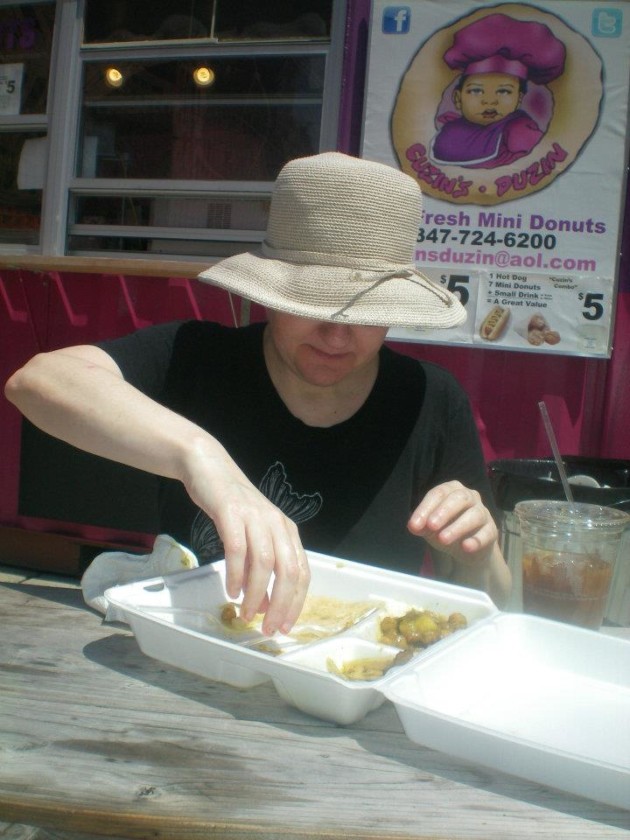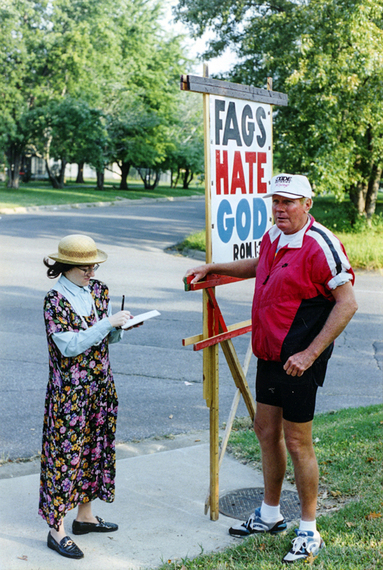The Lilith Blog 1 of 2
December 26, 2017 by Eleanor J. Bader
Meet the Jewish Lesbian Feminist Who Goes Undercover to Report on the Alt-Right

When award-winning journalist Donna Minkowitz (author of Ferocious Romance: What My Encounters with the Right Taught Me about Sex, God and Fury and Growing up Golem: How I Survived My Mother, Brooklyn and Some Really Bad Dates) attended a conference sponsored by the innocuously-named American Renaissance organization last summer, she knew she would be rubbing elbows with leaders of the alt-right. The three-day confab, held a few weeks before the Charlottesville Unite the Right rally, took place in a Tennessee state park and drew approximately 300 people, 90 percent of them male and all of them white.
Minkowitz, a self-described “secular, Jewish, lesbian feminist and leftist,” told Eleanor J. Bader about covering the event for Political Research Associates, an independently-funded social justice think tank based in Somerville, Massachusetts. She also spoke about her earlier interactions with conservative organizations.
Eleanor J. Bader: You began reporting on the right-wing back in the 1990s. How and why did you get started on this beat?
Donna Minkowitz: I was the Village Voice’s reporter on LGBT issues, and when the anti-gay Christian right started to become active again in the 1990s, I found myself becoming increasingly terrified. By 1991, the Christian Coalition was organizing in New York City, which was staggering. Most of their activism was focused on opposing the Children of the Rainbow curriculum. All the curriculum said was that same-sex parents were okay and posed no danger to children, but the Christian Right was adamantly opposed to the curriculum and they were gaining some momentum. I started writing about this for the Village Voice. When I heard that the Coalition was having a national conference in Washington, DC later that year, I decided to cover it for Out Magazine. I was in my late 20s at the time and went completely undercover—I wore conservative, feminine dresses and a very femme-y wig. It was a really intense few days.
EJB: I’ll bet! What did you learn about the Coalition, its agenda, and membership?
DM: Before I went to the conference, I hadn’t realized how deeply misogynist the Christian right actually was. I remember going to a panel on women in the military. The panelists—all of them right-wing women—said they thought it was awful that some women wanted combat roles. They also expressed anger about the enlisted women who wanted military men prosecuted for sexual harassment. Before this, I hadn’t realized how openly anti-woman the Christian right actually was. A woman was sitting next to me and when they were talking about the Tailhook sexual harassment scandal in the Navy, she said—loud enough for me to hear—“Sluts!” I was shocked that a Christian activist would say that about another woman just because she had complained about sexual harassment.
At the same time, on a personal level, being with these folks made me examine my own internalized misogyny. It was really important for me to do this. In my first book, Ferocious Romance, I wrote about all kinds of things on an emotional level that I myself had in common with the Christian right, which was pretty heavy for me to do. Besides misogyny, they were things like fear of chaos, even fear of sexuality, excessive judgmentalism, wanting to control the world—what an old acquaintance of mine used to call “the little fascist within.”
EJB: Did you attend other Christian right events during the 1990s?
DM: In 1992 I reported on the Republican National Convention for the Village Voice. That year, the RNC was held in the Houston Astrodome and I heard at least eight anti-gay speakers. Pat Buchanan spoke about the ‘culture wars’ and just about everyone who spoke hammered away at anti-gay themes.
After this, I continued covering the Christian Coalition for the Voice and Newsday. Then, in 1995, I went to a Promise Keepers rally. Their events were not open to women so I went undercover, disguised as a teenaged boy. The rally was held in a football stadium in St. Petersburg, Florida, and brought thousands of evangelical men and boys together. I didn’t talk much because I was afraid my voice would give me away. I was terrified because it was me among thousands of right-wing men, but once I knew I was passing, I got much less scared.
EJB: What did you learn?
DM: The Promise Keepers were an interesting group and their attitudes around feminism were somewhat contradictory. On one hand, they spent a lot of time talking about the need for men to stop abusing women and children and be more caring and compassionate. On the other, they expected men to be the “heads” of their households and rule over their families in a patriarchal way.
EJB: Did you encounter overt anti-Semitism at either Christian Coalition or Promise Keeper events?
DM: I don’t recall either being overtly anti-Semitic but I did hear a lot of patronizing comments, things like, ‘We love our Jewish brothers and sisters and hope that one day, we’ll be able to bring them to Christ.’
EJB: Your first book, Ferocious Romance, covered your experience with the right-wing and was released in 1998. Did you then step back from writing about conservative movements?
DM: After Matthew Shepard was killed in 1998, I covered the murder and wrote quite a bit about anti-gay violence. Then, in 2004, I covered the Republican National Convention for New York Magazine. Around that time an arm injury made it impossible for me to continue doing much investigative reporting, but over the next few years I wrote my personal memoir, Growing Up Golem, and I wrote about food as a columnist at Gay City News.

Donna Minkowitz interviewing the late anti-gay, anti-Semitic preacher Rev. Fred Phelps.
Then the 2016 election happened, and I felt that I could no longer keep writing about how good or bad a particular restaurant was. I’d once again become really frightened. I watched some alt-right YouTube videos featuring people like Richard Spencer of the National Policy Institute talking about how white people are natural conquerors and was genuinely startled by how openly anti-Semitic they are. This prompted me to start writing about the white nationalist movement, and after writing a couple of articles about their activists in Slate and The Forward, I decided to go to the American Renaissance (usually referred to as AmRen) conference hosted by Jared Taylor this summer.
EJB: Did this year’s AmRen conference have a particular theme?
DM: The main message was that white people are smarter and better than everyone else and if only these “inferior” people of color were not around to drag them down, they could achieve the great things they imagine.
AmRen says it welcomes Jews, but anti-Semitism was at the conference—it was hiding in plain sight. Eli Mosley, the head of the virulently anti-Semitic Identity Evropa, was at the conference and he and other attendees continually tweeted anti-Semitic messages; there were also loads of anti-Semitic books for sale, including The Turner Diaries, which advocates Jewish extermination.
In fact, almost every speaker was anti-Semitic. Sam Dickson, a lawyer who has represented the Klan and written for Holocaust denial journals, and members of Stormfront, was highly visible. And a Danish academic, Helmuth Nyborg, was there with “research” to “prove” that white Christians from the northwestern parts of Europe were smarter, more artistic, more creative, and better able to build “higher civilization” than anyone else.
EJB: What about women?
DM: Sam Dickson talked about the future white ethno-state he envisions. In this state, only men will be allowed to vote and run for office. No one spoke up to protest when he said this.
Dickson also explained that there is a need to get white women to have more babies, and suggested incentives to make this happen. For example, he mentioned financial incentives for men to get them to each father “legitimate” white babies. For women, he suggested that they be allowed to wear certain clothing styles—my guess is that he was referring to stylish, pretty items although he was not explicit—only after they have given birth to several legitimate white children.
EJB: How did the attendees react to you?
DM: I dressed a lot more femme than I usually do. And because I was polite and even friendly—and also, unfortunately, because I was blonde and white—I could see that people accepted me.
EJB: Were you surprised by anything that you saw or heard?
DM: I was pretty stunned by how Handmaid’s Tale-ish their plans for women in the “white ethnostate” were.
EJB: You went to a second alt-right conference for The Nation a few months later. I understand that you don’t want to name the group that sponsored the event, but can you tell me a little about the meeting itself? For example, did the attendees seem chastened by what happened in Charlottesville?
DM: In some ways, they’ve been pushed back since Charlottesville, but in other ways, they feel recharged and energized by what happened. Members of the alt-right—groups like American Renaissance, Identity Evropa, the National Policy Institute, Stormfront, the Traditionalist Workers Party, and the Traditionalist Youth Network—are pushing forward. They still pose a tremendous danger to the rest of us.
EJB: Do you plan to continue writing about the alt-right and other conservative movements?
DM: Yes. I take a lot of measures to be safe and, while I’ve come to understand that the Christian right was a lot less dangerous than the groups I’m now writing about, I’m okay with that. I feel a sense of responsibility to do this work because it’s something I can do.
EJB: Do you have a particular message for Jewish progressives and feminists?
DM: I think that the most important thing for progressive people to do in this period is to figure out what attracts people to alt-right movements. We can only stop them if we know what’s attracting people, and it’s up to us to help those folks who are being pulled into the alt-right net understand that their interests lie with the broad coalition of people who are suffering, and not with fascist movements.
The views and opinions expressed in this article are the author’s own and do not necessarily reflect those of Lilith Magazine.
 Please wait...
Please wait...